Peace Watch » Kashmir-Talk » ‘Wular Kinarya’ Vol 3- a presenation
‘Wular Kinarya’ Vol 3- a presenation
Presentation on SAG’s BOOK ‘Wular Kinarya’ Vol 3
By
Z.G. Muhammad
On
17-5-2015
Respected Chairperson, Dr. Altaf Hussain, man of the moment, Jnb. Syed Ali Geelani, Jn Ashraf Sahari Sahib, President Bar Association, Mr. Altaf Hussain former BBC Correspondent at Srinagar.
Dear friends, ladies and gentlemen.
ASA
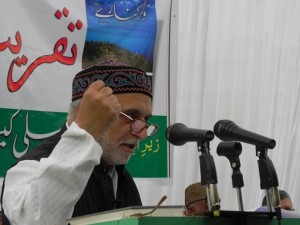 At the outset, I must thank organizers of this book release function, for giving me an opportunity to present my views on the third volume of autobiography of Syed Ali Shah Geelani Sahib.
At the outset, I must thank organizers of this book release function, for giving me an opportunity to present my views on the third volume of autobiography of Syed Ali Shah Geelani Sahib.
The moment, I started filliping through the pages of the “Wular Kinari” instantly an internationally acclaimed autobiography ‘Long Walk to Freedom’ by Nelson Mandela came to my mind. I was reminded about, how the South African leader emerge from his memoirs as ‘one distinguished from lesser practitioners of his calling mainly by his unwavering faith in his ultimate objective, ending white minority rule.’
I was equally reminded of beautifully written paragraph by an eminent American historian of South Asia, Stanley Wolpert in his preface to the biography of Quaid-I-Azam Mohammad Ali Jinnah, “Few Individuals alter the course of history. Fewer still modify the map of the world. Hardly any one is credited with creating a nation- state. Mohammad Ali Jinnah did all the three. Hailed as Quaid-i-Azam of Pakistan and its first Governor General, Jinnah virtually conjured that country into statehood by the force of his indomitable will.’
The memoires of these two great successful leaders of the twentieth century, who succeeded in steering their nations to their correct destinations will continue to be the beacon lights for all nations battling against political hegemonies and oppression and fighting for just cause of freedom and human dignity.
I remembered biographies of these two leaders of the twentieth century while reading “Wular Kinari” because of Geelani sharing two essential traits of these two leader. One, his, ‘Unwavering faith in his ultimate objective’ and second, ‘his indomitable will’.
True, unlike the movements led by Jinnah Sahib and Nelson Mandela our political struggle continues to oscillate between hope and dejection- there is more of disappointment, sometimes bordering on despondency.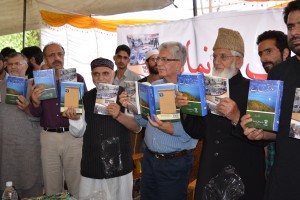
In the history of nations fighting for their civil and political rights or freedom there have been moments when leadership was caught up in troughs of despondency. Nevertheless, it was faith of the people in their goals that not only kept them afloat but ultimately enabled them to emerge triumphant.
Ours is a unique history. Most of the nations that started seeking their fundamental right i.e. right to self-determination along with us, have now been enjoying liberty for many decades- besides us only people of Palestine are still fighting for their freedom.
History, during ninety years of our struggle, did throw up many an opportunities when it seemed we are about to reach to our destination. Nevertheless, we failed to grab these opportunities and like in badly played football match our ‘central forwards’ instead of taking a shot at the goal post have more than often handed over ball to the rival the team to play at. And we failed to emerge victorious. Despite, these mistakes generation after generation we string to win this match and have not given up.
Many times, it puzzles me, why we are there only we were in 1924, when our elders presented a 17 point memorandum to Lord Reading on his visit to Kashmir. If you read or re-read this memorandum, you will be surprised to find out that our charter of demands even today continues to be the same.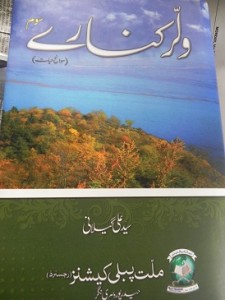
It is not to say that our ancestors, our generation and generation after us did not struggle for their birth right. Notwithstanding, our movement meeting many a waterloos in the past… for fighting battle for our rights chivalrously in the history of the nation we occupy a place of distinction,
As a student of contemporary history, one question has been poignantly haunting my mind. Why protagonists of our movement have sadly stumbled at the delivery point. And have pushed people from one maelstrom into another maelstrom- and continue to do it even today.
In fact, I started reading third volume of Geelani Sahib’s autobiography with the expectation that out Geelani Sahib’s long experience, I will find answer in autobiography- I have read all the three volumes- yes between the lines.
Geelani has not directly addressed this question but he does identify some fault lines in our struggle. That have defeated our struggle at most decisive moments. This volume, as eminent economist of international repute Prof. Khurshid Ahmed, founder President of Institute of Policy studies, Islamabad had said about the second volume of the autobiography will also work as a valuable “manual” that will serve as a guiding star for the youth and the future generation of the State.
The 660 pages hardbound book priced at rupees 475, published by the Millat Publishers, Srinagar belong to genera of autobiographies- so like autobiographies it is subjective and not a research scholar’s thesis about past two decades. Nevertheless, largely it provides a chronology of events between 1995- 2014. And also provides some insight into behind the scene developments within the Jammat-I-Islamia- the party where for which author has almost worked for whole of his life.
In the post 1990 phase, the period that book covers is one of the most crucial periods because lots of development in a quick succession took place during these eighteen years. There were lots of development within the Hurriyat Conference that ultimately led to its vertical divide. The armed struggle that started with a bang slow and steadily died during the period with a whimper. The GOI launched terrifying counter insurgency operations- thousands turned renegades and target and indiscriminate killings multiplied. The author mentions about the unilateral ceasefire by the H.M but fails in informing the readers how this whole drama was enacted and what was its impact not only the Jamat-i-Islamia but Hurriyat Conference as well.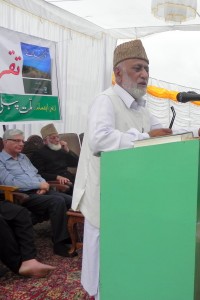
Though there was not much of Kashmir related activity at the international level except Kashmir Diaspora organizing conference in various parts of the world. Pakistan after 1993, never thought of taking Kashmir to the UN. Nevertheless, India and Pakistan remained engaged on Kashmir even at the Summit level- resulting in the Lahore Declaration, the Agra Summit that despite fiasco is seen an important milestone in India-Pakistan relations. In the post 2002 standoff composite dialogue started between Islamabad and New Delhi – leading to introduction of CBMs, with opening of the Jhelum Valley Road and other transit points and trade across the LOC.
The backtrack, track-II and Track III diplomacy started showing positive results and because of this diplomacy despite Kargil War and Indian Parliament incident- the two countries remained in touch. This composite dialogue culminated in a serious engagement between Islamabad and New Delhi on four point formula – and it seemed that an agreement had been inked was just to be signed. Geelani Sahib has in third volume covered almost all the developments and also recorded his commentary on these development- yes of course briefly.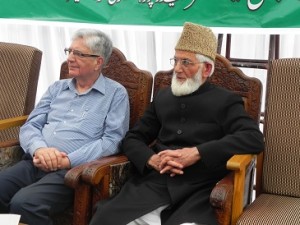
It was a transition from “armed struggle” to ‘intifada’. The three summers of dissent 2008, 2009 and 2010. In this review, it will not be possible to comment on every incident recorded in the book or to analyse every event that had direct or indirect impact on the ongoing political struggle in Jammu and Kashmir.
The announcement of holding Assembly election after six years New Delhi direct rule in 1996 was an important development. It was a big challenge for three year old APHC to establish itself as an organization representing political urges of overwhelming majority of the state. Through successful boycott of these elections with Syed Ali Geelani, Abdul Gani Lone, and Mohammad Yasin Malik and in the vanguard the organization proved it was the representative political forum in the state. The author for future generation should have written in greater detail about the elections which has passed into history as military exercise. And has been subtly documented by number of human rights organization and even by some Indian authors.
There can now be no denying that in the post 1990 period- when militancy was it its peak need was felt by a section of leaders for creating a political wing and Tahreek Hurriyat was born. In second volume Geelani Sahib has written about birth of this organization and the genesis of the Hurriyat Conference- in fact he written about it in his jail memoirs Rodad-Qafas also- which I had reviewed for a New Delhi journal along with two other books- Jihid-i-Musalsal and translation of Sheikh Abdullah autobiography translated by Khushwant Singh.
In the post 1993 scenario, I see the birth of the APHC as forum and not as a political organization as a fault line in the contemporary Kashmir movement. With people from diverse backgrounds, nursing different political ambition it could not emerge as a potent force. It was combine of assortments including round pegs in square holes. There was no cohesiveness in the conglomerate. It was bound to fall apart. True, remained together for a decade that was more out of compulsion than conviction.
The election for the chairman by drawing lots that author mentions in his autobiography was indicative that the organization lacked understanding even on the fundamental issues. Had not divine forces at the time of drawing of lots intervened Geelani could never have become the Chairman of the conglomerate which he also mentions in this autobiography.
After Geelani Sahib’s term as chairman was over, a college teacher –turned leader Abdul Ghani Bhat was selected as chairman. Author believes as compared to him Abdul Gani Lone was better experienced. The author should have shared behind the scene development on the night of elections with readers and informed them about the who machinations that brought Prof. Bhat to coveted position of chairman of the conglomerate.
For his readers more particularly, the younger generations the author should have dwelled in detail how bilaterally signed agreements could not overtake the agreements concluded at the Security Council. The four point formula of Pakistan President General Pervez Musharraf, which he called as “out of box solution” is one of the chapters.
Seeing this formula as total U-turn from historically stated position of Pakistan and a betrayal of fundamental right of the people of Jammu and Kashmir, the protagonists of right to self-determination movement attributes this change in Pervez Musharraf to his loss of ‘self-confidence and mental depression.’
What made Pervez Musharraf to take a U-turn is matter of debate- how commando General whom Geelani Sahib during Agra summit had praised for his commitment to Kashmir cause had changed is an important but it would be too myopic an understanding to say that four point formula was a result of his loss of “confidence”.
In fact this formula or a solution on similar lines permeates through Kashmir narrative since fifties. In 1950, Mr. P. L. Lakhanpal had suggested holding a round table to debate a formula on similar lines- for paucity of time I cannot recap entire formula of Lakhanpal. Equally we see in a critique by Pran Chopra of a similar formula which talked about porous borders, joint management, demilitarization worked out by CPR. The book of Pran Chopra, India-Pakistan and Kashmir Tangle was published in 1993. Iqbal Ahmed wrote couple of article on a formula on similar lines in the Dawn before it was picked up by Musharraf.
True, we do not agree with the formula but it would be inappropriate that it was result of loss-of self-confidence. Here I would love to reproduces a quote from an article by Ambassador Yusuf Buch on the subject, “Any roadmap which deviates from the principle laid down in agreement concerning Kashmir is bound to be arbitrary in conception and a failure in effect.”
Towards, the end let me that the three volume autobiography will be a lodestar for research scholars working on growth and development of Jammat-I-Islamia in Jammu and Kashmir and on the Kashmir Dispute.
Filed under: Kashmir-Talk








At the out set, I quote Stanely Wolpert , “few individuals alter the course of history. Fewer still modify the history of the world……hardly any one is credited with creating a nation state. M.A.Jinnah did all the three.” Our problem is that we too were bestowed with a tall leader that could have been compared with Nelson Mandela etc but the man did completely contrary to above three fundamental principles from positive to negative direction. He altered the course of history the day he replaced Muslim conference by National conference on the instance of non state powers against the drive of history and it’s people.secondly, he modified the history of Indian sub continent by creating Kashmir problem for his personal ends. Maharaja was caught between Sheikh a proindian, India refusing stand still agreement to maintain independent status of his state and popular will of the people . Thirdly, by creating political instability through insain movement like quite Kashmir etc he brought down a sovereign independent state, a nation state to the level of slavery as he himself was crying in his self criticism. If any sensible person picks up world history it is hard to find a traitor of this magnitude; who even after 1947 let the ball of Kashmir problem rolling when it suited his political ends. History is witness of the fact that once outside forces enter in a territory they modify it’s economic, social, cultural and political parameters to trample long time institutional and popular resentment and breed the culture of assimilation in all levels. After 1947 the patriotic movements, resistance forums with its political workers and leaders like syed Ali shah Gilani have had role to play to remind promises for final settlement but it is a process that continues for genrations to come. The role of these great men have very often little bearing on the means for the solution of the problem. But where these people of indomitable will have extremely historic role to play is simply not to let the remaining political, institutional and constitutional independence to get compromised to end up the very cultural and political identity of the people.